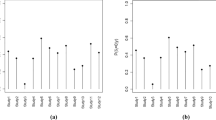Abstract
Objective
In the light of the recent failure of a large cardiovascular mortality and morbidity study with torcetrapib, we have undertaken a post hoc review of the decisions taken by the Data and Safety Monitoring Board (DSMB) in that study. A number of other studies in which complex decisions were made by DSMBs are also reviewed.
Results
The examples illustrate the complexities involved in the decision-making process by DSMBs and indicate that too much reliance on formal statistical stopping rules should be avoided due to a risk of delaying the identification of an unacceptable emergent safety signal.
Methods
The review was based on information submitted by the sponsors of the studies to the Medical Products Agency.
Conclusions
Multiple approaches to assessing the efficacy and safety in clinical trials need to be considered in order to facilitate early stopping of clinical trials with a negative risk benefit balance. Such systems may, for example, include the use of p-value flags and/or a complementary statistical analysis of the likelihood of achieving the study objective based on the data obtained to date.
Similar content being viewed by others
References
Marshall E (2006) Clinical research. Lessons from a failed drug trial. Science 313(5789):901
Jensen GB, Hampton H (2007) Early termination of drug trials. Br Med J 334:326
Zhong S, Sharp DS, Grove JS, Bruce C, Yano K, Curb JD et al (1996) Increased coronary heart disease in Japanese-American men with mutation in the cholesteryl ester transfer protein gene despite increased HDL levels. J Clin Invest 97(12):2917–2923
Hirano K, Yamashita S, Nakajima N, Arai T, Maruyama T, Yoshida Y et al (1997) Genetic cholesteryl ester transfer protein deficiency is extremely frequent in the Omagari area of Japan. Marked hyperalphalipoproteinemia caused by CETP gene mutation is not associated with longevity. Arterioscler Thromb Vasc Biol 17(6):1053–1059
Borggreve SE, Hillege HL, Wolffenbuttel BH, de Jong PE, Zuurman MW, van der SG et al (2006) An increased coronary risk is paradoxically associated with common cholesteryl ester transfer protein gene variations that relate to higher high-density lipoprotein cholesterol: a population-based study. J Clin Endocrinol Metab 91(9):3382–3388
Ordovas JM, Cupples LA, Corella D, Otvos JD, Osgood D, Martinez A et al (2000) Association of cholesteryl ester transfer protein-TaqIB polymorphism with variations in lipoprotein subclasses and coronary heart disease risk: the Framingham study. Arterioscler Thromb Vasc Biol 20(5):1323–1329
Boekholdt SM, Thompson JF (2003) Natural genetic variation as a tool in understanding the role of CETP in lipid levels and disease. J Lipid Res 44(6):1080–1093
Nissen SE, Wolski K (2007) Effect of rosiglitazone on the risk of myocardial infarction and death from cardiovascular causes. N Engl J Med 356(24):2457–2471
DeMets DL, Pocock SJ, Julian DG (1999) The agonising negative trend in monitoring of clinical trials. Lancet 354(9194):1983–1988
Author information
Authors and Affiliations
Corresponding author
Rights and permissions
About this article
Cite this article
Hedenmalm, K., Melander, H. & Alvan, G. The conscientious judgement of a DSMB – statistical stopping rules re-examined. Eur J Clin Pharmacol 64, 69–72 (2008). https://doi.org/10.1007/s00228-007-0403-4
Received:
Accepted:
Published:
Issue Date:
DOI: https://doi.org/10.1007/s00228-007-0403-4




